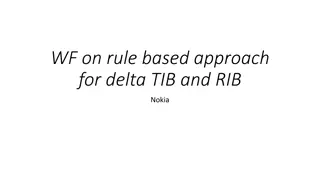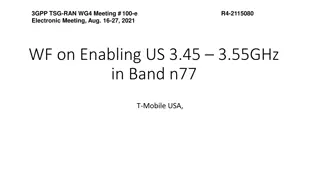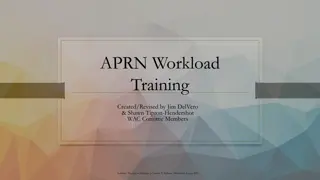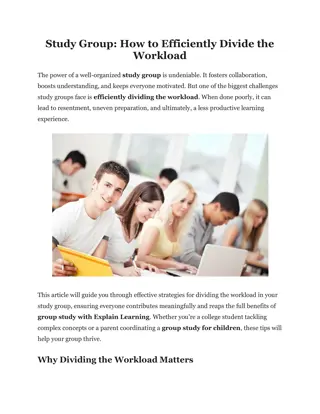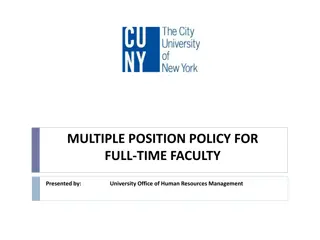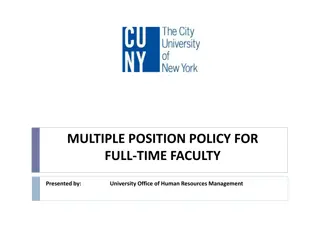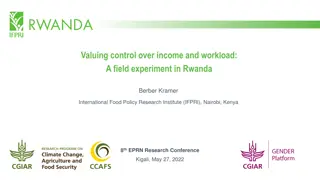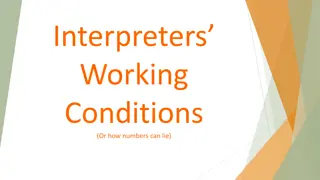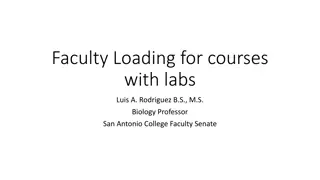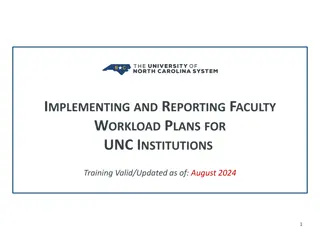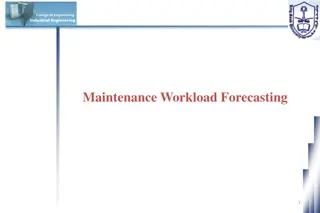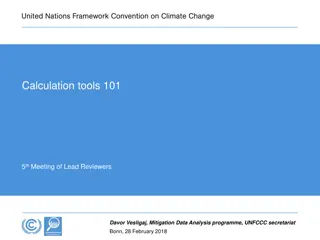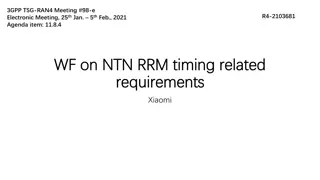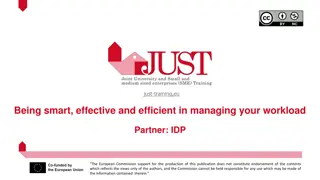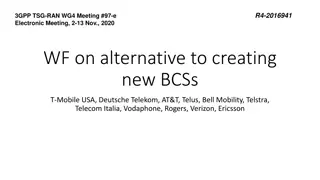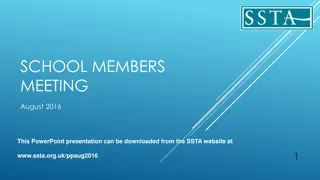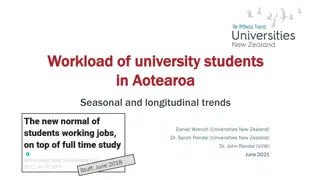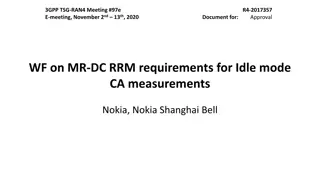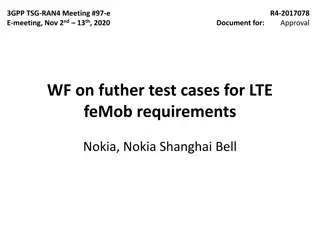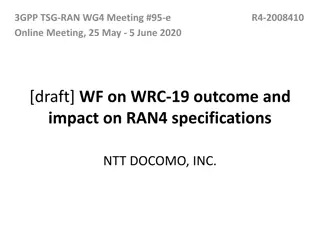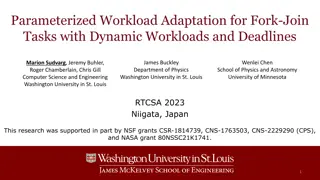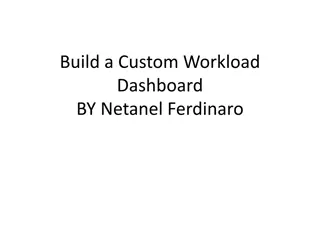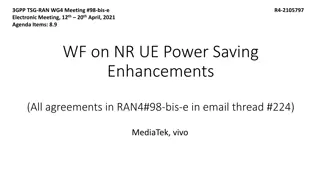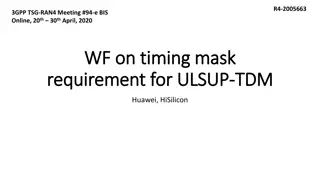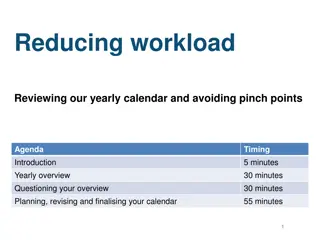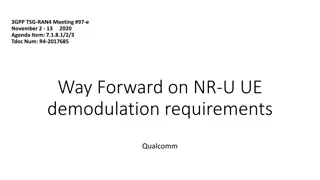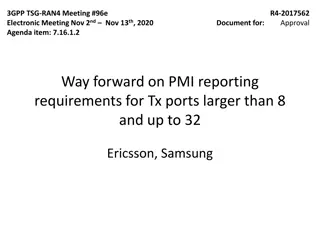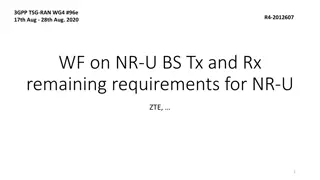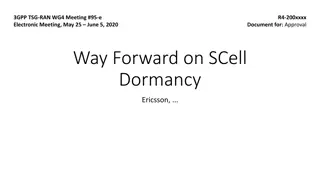WISK: A Workload-aware Learned Index for Spatial Keyword Queries
WISK, a workload-aware learned index that combines spatial and keyword queries to efficiently retrieve objects. It integrates spatial and textual indexes and considers query workload information.
1 views • 17 slides
Efficient On-Site Composting Methods for Reducing Manure Workload
On-site composting can significantly reduce the workload associated with managing manure on small farms. By following principles of economy of effort and the O.H.I.O principle (Only Handle It Once), manual loading methods and efficient composting techniques can transform manure into valuable compost
6 views • 19 slides
Evolution of Rule-Based Approach for Defining dTib and dRib Values in Nokia RAN4
Proposal in RAN4#99 explores a rule-based approach for defining dTib and dRib values, aiming to complement table compression efforts. The study discusses how certain band combinations follow specific rules and handles cases individually. RAN4 plans to further discuss defining rule sets for deriving
1 views • 5 slides
RAN4 Discussion on Enabling 3.45-3.55GHz in Band n77 for T-Mobile USA
In the electronic meeting of 3GPP TSG-RAN WG4, Issue 1.5-1 and Issue 1.5-2 were discussed regarding how to differentiate UEs supporting the new frequency range and modifying NOTE 12 in Table 5.2-1 in TS 38.101-1 to include the support of 3.45-3.55GHz in addition to 3.7-3.98GHz for Band n77 in the US
0 views • 6 slides
APRN Workload Training
Article 14 highlights the importance of addressing excessive workload in nursing units for quality patient care and staff satisfaction. A workload review committee is established to provide education, resources, and data analysis related to staffing, scheduling, and workload management. The new APRN
0 views • 17 slides
Study Group How to Efficiently Divide the Workload
This article will guide you through effective strategies for dividing the workload in your study group, ensuring everyone contributes meaningfully and reaps the full benefits of group study with Explain Learning. Know more \/\/explainlearning.com\/blog\/study-group-efficiently-divide-workload\/
1 views • 4 slides
University Faculty Multiple Position Policy
The Multiple Position Policy for Full-Time Faculty covers various employment scenarios for full-time faculty members, excluding adjunct faculty. It sets guidelines for workload, teaching hours, and permissible non-teaching assignments within the university. The policy aims to ensure a balanced and m
0 views • 24 slides
Understanding OpenStack Availability Zones for Optimal Workload Availability
Delve into the concept, design, and implementation of Availability Zones (AZs) in OpenStack through a detailed discussion by Craig Anderson, Principal Cloud Architect at AT&T. Explore the benefits of AZs, strategies for organizing them, and the value proposition they offer for achieving high workloa
1 views • 32 slides
University Full-Time Faculty Multiple Position Policy
This policy outlines guidelines and restrictions for full-time faculty members at the university regarding engaging in multiple positions, including employment, consultative work, and overload teaching. It covers definitions, workload expectations, and specific details for adjunct faculty workload.
1 views • 24 slides
Valuing Control Over Income and Workload in Rwanda
Field experiment in Rwanda explores trade-offs for policymakers, such as introducing new crop varieties impacting income control for women. The study assesses the value of programs affecting workload, income autonomy, and empowerment through lab-in-the-field experiments and surveys. Experimental tas
2 views • 11 slides
The Importance of Directed Time Calendars in Managing Workload
Understanding directed time calendars is essential for educators to manage workload effectively. These calendars outline teachers' working hours and responsibilities, helping to combat excessive workload issues. By monitoring directed time and engaging in the bargaining calendar, educators can addre
0 views • 8 slides
Coaching Your Managers to Reduce HR Workload and Increase Employee Effectiveness
Learn how to encourage managers to take a coaching approach, utilize the Four-step Situational Coaching Model, and effectively address employee performance issues. This coaching program aims to decrease HR workload, boost management credibility, enhance motivation, and improve organizational effecti
0 views • 11 slides
Design for Better Workload: Analyzing Burnout and Finding Solutions
This guide focuses on analyzing burnout root causes, identifying potential solutions, and leveraging team resources for better workload balance. It provides methods to address work overload, fatigue, resource allocation issues, and emphasizes team collaboration and knowledge sharing for effective re
0 views • 9 slides
Improving Interpreters' Working Conditions Through Strategic Changes
Recognizing discrepancies in workload distribution among interpreters, the need for a more efficient system was acknowledged. By abolishing interpretation slots and implementing new working conditions, productivity gains were evident, primarily from other efficiency measures. The new system aimed to
2 views • 36 slides
Understanding Faculty Loading for Courses with Labs
This content provides valuable insights into the faculty loading criteria for courses with labs at San Antonio College, covering definitions of open and instructional laboratory courses, Alamo Colleges District policies, examples of lab loading, and discussions on pay inequity related to workload un
0 views • 8 slides
UNC Faculty Workload Policy Training Overview
This training focuses on implementing and reporting faculty workload plans for UNC institutions based on Policy 400.3.4 and Regulation 400.3.4[R]. It covers the purpose, definitions, significant dates, best practices, requirements, and institutional reporting related to faculty workload. The objecti
0 views • 18 slides
Industrial Engineering Maintenance Workload Forecasting
Maintenance workload forecasting and capacity planning play vital roles in designing an effective maintenance system. This involves estimating maintenance load, categorizing maintenance works as planned or unplanned, and determining resources needed for capacity planning. Forecasting techniques incl
0 views • 35 slides
Agreements on Core Requirement Maintenance of Direct SCell Activation
Companies provided contributions on core requirement maintenance to RAN4#99-e, focusing on timelines, known conditions, and measurement thresholds for Direct SCell Activation in NR.FRI. This document outlines unresolved issues and agreements reached regarding activation procedures, condition require
0 views • 6 slides
Dynamic Core Boosting for Heterogeneous Computing
Exploring the challenges of workload heterogeneity in parallel programming, focusing on the impact of asymmetric hardware on performance and synchronization. Insights on modeling workload imbalance and boosting critical paths for efficient computation in heterogeneous multicores.
0 views • 22 slides
Overview of Calculation Tools for Mitigation Data Analysis Program under UNFCCC Secretariat
This content discusses various calculation tools used in the Mitigation Data Analysis program of the UNFCCC Secretariat. It includes tools for GHG projections, financial support, and their integration into Country briefs to facilitate accurate data presentation and reduce workload during reviews. De
0 views • 7 slides
NTN RRM Timing Related Requirements for Xiaomi Devices at 3GPP TSG-RAN4 Meeting #98-e
The agenda item for the 3GPP TSG-RAN4 Meeting #98-e involves discussing NTN RRM timing related requirements, specifically focusing on UE timing synchronization for Xiaomi devices. Key aspects include UE transmit timing error limits, timing advance accuracy, and UE timer accuracy requirements for NTN
0 views • 6 slides
Efficient Workload Management Techniques for Hybrid Workers
Learn how to be smart, effective, and efficient in managing your workload with the work-breakdown approach. Develop a better understanding of task prioritization and master effective strategies to perform under pressure. Discover valuable insights to balance your workload and prioritize tasks effect
0 views • 17 slides
Proposals for BCS4 Implementation in 3GPP TSG-RAN-WG4 Meeting #97-e
In the 3GPP TSG-RAN-WG4 Meeting #97-e, proposals were discussed regarding the implementation of BCS4 to address existing issues with BCS systems in inter-band and intra-band NR-CA scenarios. The introduction of BCS4 aims to reduce RAN4 workload, improve efficiency in analyzing new channel bandwidths
0 views • 5 slides
SSTA School Members Meeting Presentation August 2016
Presentation overview of the SSTA School Members Meeting in August 2016 discussing workload issues, survey results, upcoming actions, and the importance of voting in the formal ballot for reducing teacher workload. Includes images and key questions for consideration.
0 views • 11 slides
Exploring AP Spanish Language and Culture: What to Expect and Is It Worth It?
This guide provides insights into AP Spanish Language and Culture, focusing on communication skills, exam pass rates, workload, and the course's value. Discover what to expect, the emphasis on communication skills, exam pass rates, workload breakdown, and whether AP Spanish Language is a worthwhile
0 views • 11 slides
Seasonal and Longitudinal Trends in University Students' Workload in Aotearoa
This study examines the workload of university students in Aotearoa, focusing on seasonal and longitudinal trends. The research, conducted by Daniel Wrench and Dr. Sarah Randal from Universities New Zealand along with Dr. John Randal from VUW, explores estimated mean weekly hours worked, annual empl
0 views • 4 slides
3GPP TSG-RAN4 Meeting #97e Summary
During the 3GPP TSG-RAN4 Meeting #97e, discussions on Multi-RAT Dual Connectivity and Carrier Aggregation enhancements were held. A Work Item (WF) focusing on Idle mode Carrier Aggregation (CA) measurement Radio Resource Management (RRM) requirements was addressed. The meeting included topics such a
0 views • 17 slides
LTE feMob RAN4 Meeting Test Cases Approval Document
Approval document for LTE feMob test cases was discussed in the 3GPP TSG-RAN4 Meeting #97-e. Nokia, Nokia Shanghai Bell, Qualcomm, and Huawei are responsible for various test cases related to intra-band, inter-frequency synchronous, and asynchronous handovers. The meeting also outlined new inter-fre
0 views • 4 slides
Regulatory Requirements in TS38.101-2 and Impact on RAN4 Specifications
Common understanding of the regulatory requirements outlined in TS38.101-2 for bands n258, n257, n260, and n259, including issues related to NS values, A-MPR, connectivity, and transitional periods. Agreements and solutions discussed in RAN4#94-e-bis meeting to address NS mapping, A-MPR issues, and
0 views • 10 slides
Parameterized Workload Adaptation for Fork-Join Tasks with Dynamic Workloads and Deadlines
In dynamic environments, tasks may face unknown workloads and deadlines, leading to system overload and missed deadlines. This research focuses on adapting task workloads to provide results before the deadline by adjusting computational parameters. It explores how to minimize degradation of result u
0 views • 31 slides
Building a Custom Workload Dashboard with Netanel Ferdinaro
Learn how to create a personalized workload dashboard with Netanel Ferdinaro. Follow the step-by-step instructions to customize your dashboard, add data sources, and configure display settings. Enhance your monitoring capabilities and analyze workload performance efficiently.
0 views • 9 slides
RAN4 Meeting #98-bis-e Summary and Issues on NR UE Power Saving Enhancements
During the RAN4 Meeting #98-bis-e, discussions focused on various issues related to NR UE power saving enhancements. Topics included Applicable DRX cycles, relaxation factors, criteria for RLM/BFD relaxation, and low mobility criteria. Evaluations on RRM measurements and interaction between PDCCH an
0 views • 18 slides
Discussion on Timing Mask Requirement for ULSUP-TDM in RAN4#94e Meeting
In the RAN4#94e and #94e-Bis meetings, discussions were held on the timing mask requirement for ULSUP-TDM, particularly focusing on sub-topics like evaluating uplink timing differences between LTE and NR, clarifying present time mask conditions, and testing time mask requirements. The key issue cent
0 views • 4 slides
State Veterinarian Staffing Challenges and Workload Trends Over 10 Years
Drastic changes in staff numbers and workload at the Office of State Veterinarian are evident over the past decade. Despite significant increases in workload due to various factors like the rise in the population of farmed cervids and poultry flocks, the staff has been reduced from 69 in 2002 to a l
0 views • 12 slides
Virginia Judicial Workload Assessment 2024 Overview
The Virginia Judicial Workload Assessment 2024 aims to provide an objective measure of judicial workload for determining judgeships. It involves a comprehensive approach using quantitative and qualitative data to assess the need for judges in Circuit, General District, and Juvenile & Domestic Relati
0 views • 27 slides
Yearly Calendar Review: Eliminating Workload Pinch Points
Delve into the yearly calendar to identify and address high workload periods, with a focus on avoiding pinch points. Teachers reflect on key moments of intense workload, propose adjustments, and ponder ways to distribute tasks more efficiently, ultimately aiming to reduce stress and enhance producti
0 views • 10 slides
Test Scope and Requirements for NR-U Demodulation in 3GPP TSG-RAN4 Meeting #97-e
The document outlines the test scope and requirements for demodulating NR-U (Unlicensed) signals in the context of the 3GPP TSG-RAN4 Meeting #97-e. It covers topics such as defining test scenarios, bandwidth options, downlink transmission models, and the prioritization of test cases for dynamic chan
0 views • 15 slides
3GPP TSG-RAN4 Meeting #96e - Way Forward on PMI Reporting Requirements
Approval document for addressing PMI reporting requirements for Tx ports larger than 8 and up to 32 by Ericsson and Samsung discussed during 3GPP TSG-RAN4 Meeting #96e. The timeline includes agreements from previous meetings (#92, #92bis, #93, #94e, #94e-Bis, #95e) along with simulation assumptions
0 views • 11 slides
Remaining Requirements for NR-U BS Type 1-C and 1-H in RAN4 #96e Meeting
In the RAN4 #96e meeting, open issues related to NR-U BS requirements were discussed, including support for AAS BS type, IBB/OOBB requirements, frequency offset for interfering signals, and LO leakage exception for NR-U BS Tx. Proposals were made and agreements reached regarding frequency offsets fo
0 views • 6 slides
Discussion on SCell Dormancy and Switching in RAN4#95e Meeting
At the recent RAN4#95e meeting, various topics related to SCell dormancy and switching were discussed, including delays in transitioning between dormancy and non-dormancy states, interruptions during switching, and CSI/RRM measurements during dormancy. Agreement was reached on switching conditions b
0 views • 14 slides


